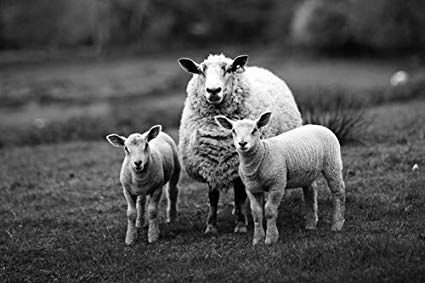We lost Sheepy in the last row of our airplane to New York.
To Lola, Sheepy felt like oxygen, food, water, safety, love and peace. To most everyone else, Sheepy was a ragged cloth with a pink nose and two black ceramic eyes. Gray and white abrasions covered the black beads, evidence of time well spent. It looked like Sheepy had cataracts.
Lola’s forced separation from Sheepy was (thank G-d), the hardest thing she had done in her ten years. Her tears and anxiety overtook our vacation time. I snapped into action, talking the crew into searching the plane when it landed in the next city. When that didn’t work, I called the lost & found of each airport. When that didn’t work, I drove to the airport to look there. In desperation, I called the office of the CEO of the airline and later wrote to him.
To me and Lola, getting Sheepy back was not just desired, it seemed necessary. I had not thought about the lessons I learned from Pema Chödrin and other Buddhist thinkers about the dangers of attachment. I was just too busy trying to fix the problem and find Sheepy.
After three days, the chances of reuniting Lola and Sheepy seemed increasingly remote. It was only then I thought to turn this loss into an intentional act of letting go. I told Lola how proud I was of her ability to go to sleep the last two nights even though she had great troubles falling asleep in the past when she was accidentally separated from Sheepy. “That’s because I knew you would find her.”
I sat Lola down on a bench (we were in a mall department store) and asked Lola if she could come up with another thought, other than finding Sheepy, which would help her sleep tonight. “The only thought that would work is that I’m ten years-old and I don’t need Sheepy anymore, but that would be a lie. I cannot tell myself a lie.” I took her hand and told her that often there is more than one truth and that if you believe only one truth, all other truths seem to be lies. “What if it is also true that you don’t need Sheepy even though you love Sheepy?”
I asked Lola to play the “truth game,” where she might convince herself to realize another truth. “You know how you like drinking Coke? Let’s go to the food court and get a drink.” When they got to the food court, Dad asked Lola to play the game. “Think of how weird those bubbles feel in your mouth and how they snap and crackle roughly against your tongue. Think of how badly the bubbles feel and how it tastes too sweet and syrupy.” Lola asked for a lemonade. I bought her a coke. “Did you believe the Coke tasted badly?” I asked. Lola looked at me with wonder. “I knew I would love it but with those thoughts in my mind, it was grossing me out and I didn’t want it anymore.” Lola our on a knowing look. “I also knew you were going to get me a Coke because you were trying to teach me a lesson.” I responded, “Do you see how you can also tell yourself a story, a true story, about Sheepy?”
This ability to tell ourselves a story and to believe it, is a trait unique to humanity. When we believe a story, even with intermittent doubt, it changes the world we inhabit. Many have experiences similar to Lola. It could be of a security blanket or something far more impacting like the loss of a loved one. Many also have challenges and dreams they need to overcome and succeed. The tools Lola used to cure her loss are the very same tools used by financially successful people to achieve great wealth. It is mind over matter. As was said by Henley, “I am the master of my fate and the captain of my soul.” Napoleon Hill said we should add the words “… because I control my thoughts.” Ray Bradbury said that “Learning to let go should be learned before learning to get.” Maybe, we can say that we have control over our minds and that we also have the ability to let go of things that don’t help us to grow. Together, these are hugely powerful tools for peace of mind and the accumulation of wealth.
